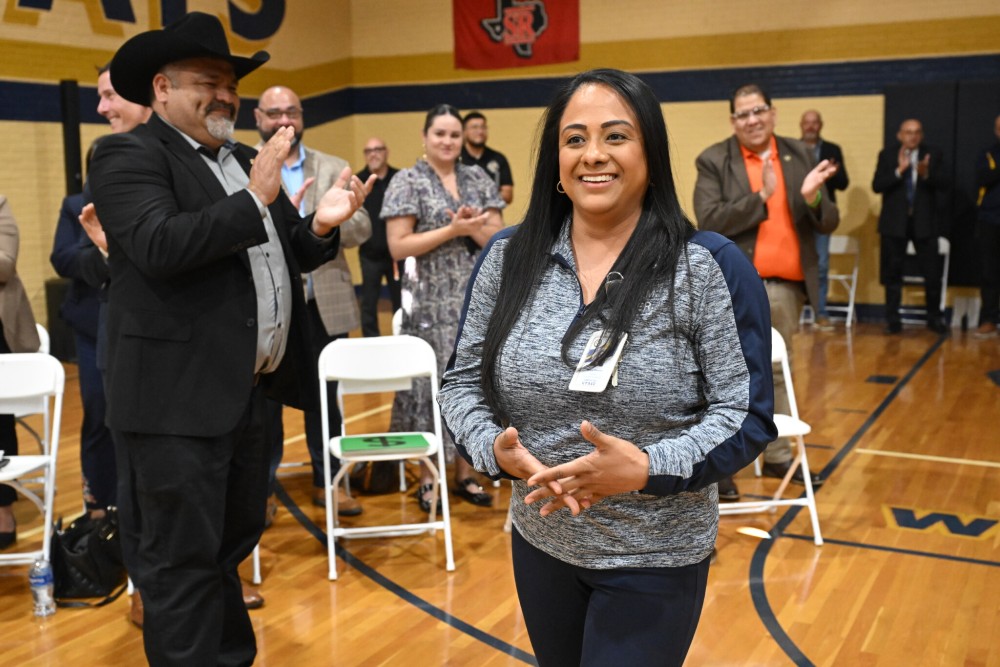Spotlight: Nancy Chavira (TX '24)
September 11, 2025
Texas Milken Educator Nancy Chavira is a fifth grade math and science teacher at Johanna O’Donnell Intermediate School. Chavira is a force of nature in the classroom, inspiring her students with resilience and a passion for learning. A bilingual educator who sets the bar high in math and science, she fosters deep understanding while mentoring new teachers and leading community initiatives. Chavira received a Milken Educator Award on February 7, 2025.
Milken Family Foundation: How did you feel at your Milken Educator Award notification?
I was completely overwhelmed in the best way possible. Being recognized with the Milken Educator Award was both humbling and affirming. I thought of every student, every colleague, every challenge, and every success that led me to that moment. It reminded me why we do what we do: to make a lasting difference in the lives of others.
MFF: How did students respond to your Milken Award?
At my school, we are departmentalized, so I co-teach with a partner. After the Award announcement, my co-partner teacher heard one of our students say, “I know what I want to do when I grow up—I want to be a teacher.” That simple statement meant so much. It was a reminder of how impactful representation and encouragement can be. I also received handwritten notes from students in other classrooms congratulating me and saying they hoped to be in my class when they reached fifth grade.
MFF: What made you want to pursue a career in education?
My journey in education began with a deep love for learning and helping others succeed. Growing up, I had some amazing teachers who made a lasting impact on me. Their ability to inspire and make complex subjects feel accessible was something that stuck with me. I realized that I wanted to have a similar influence on students, especially in subjects like math, where many students struggle. My desire to create that “aha” moment for students led me to pursue teaching.
MFF: How do you integrate perseverance and life skills into your math and science lessons in a dual-language classroom?
In my dual-language classroom, I intentionally build in opportunities for productive struggle—especially in math and science. I emphasize a growth mindset and model resilience when we encounter challenges. We also explore real-world problems that connect to students’ lives, helping them see how perseverance, collaboration and communication are essential, not just in the classroom, but also in life.
MFF: What key advice do you give new teachers in bilingual classrooms to support both learning and language development?
My biggest piece of advice: honor both languages as assets and build on students’ cultural identities. Create space for meaningful conversation and academic discourse in both languages. Be intentional with scaffolding, but trust students’ ability to grow with support. And most importantly, build relationships first. Language thrives where students feel safe and seen.
MFF: What does “success” look like for you and your students in life?
Success for me isn’t just about test scores—it’s also about empowerment. When students leave my classroom feeling confident in their identity, capable of critical thinking, and ready to contribute meaningfully to their communities, that’s success. It’s about nurturing whole humans who can lead with heart and purpose.
MFF: Who are your role models in education?
I deeply admire educators who are committed to equity and lead with humility—those who dare to transform what education can be, all while staying grounded in the joy and purpose of teaching.
MFF: How do you hope to be remembered by your students?
I hope my students remember me as someone who believed in them unconditionally, challenged them to think deeply, and created a classroom where they felt safe to be themselves. I want them to remember that they mattered—not just for their achievements, but also for who they are.
Don’t miss any new articles and updates from Milken Educator Awards:


